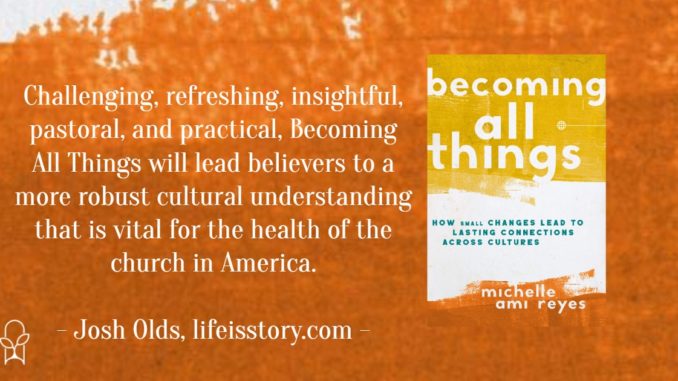
Published by Zondervan on April 27, 2021
Genres: Non-Fiction, Christian Life, Racial Reconciliation
Buy on Amazon
Goodreads

Cultural identities and cross-cultural engagement are not things that anyone can choose to ignore anymore, least of all Christians. Many of us want to have diverse friends and are passionate about justice. But if we are serious about cross-cultural relationships--real relationships that lead to understanding, healing and solidarity across cultural lines--we need to be willing to change. And that's not something that comes easy for any of us.
In Becoming All Things, Michelle Reyes offers a poignant discussion on the challenges surrounding cross-cultural relationships in America today, including the reasons for cultural difference, stereotyping, appropriation, gentrification, racism, and more. Seeking to deconstruct these things in our own lives, Reyes focuses on the concept of cultural accommodation in 1 Corinthians 9:19-23, and looks at the ways in which we need to adapt who we are in order to become all things to all people. The problems inherent in cross-cultural relationships have to do with us. We have to do better.
With language that's witty, funny, and accessible, Reyes offers hope for majority and minority alike by showing what's possible when all of us are willing to try something new.
In 2013, I moved from rural Indiana—which had a sum total of 26 Asian people in the 2000 census—to Tulsa, Oklahoma to be the youth pastor of an Asian church. My new church had more Asian people than my old hometown. This is relevant to Becoming All Things, because for the first time in my life, I wasn’t a part of the majority culture. Not inside those walls. And while I always had the ability to step outside and regain my position within the larger culture, my new friends could not—at least not entirely. This was the beginning of my journey in racial justice advocacy and it opened my eyes to the need for white evangelicals to build cross-cultural connections that honor and uplift our minority brothers and sisters.
In Becoming All Things, Michelle Ami Reyes gives the church a blueprint for true integration and fellowship. While her words apply to all Christians of all ethnic backgrounds, they are the loudest and most necessary for the white evangelical church. Too often, American churches have confused culture for faith. This was a true a few hundred years ago when European and American missionaries attempted to convert African and Asian peoples to a faith that also insisted upon westernizing them. This is true today amid a strong and vocal segment of faith who equate American and Christian values as one and the same. This book is a gentle reminder that Christianity can exist within all cultures and that Christ calls us to work within and uplift all cultures for the glory of his Kingdom.
Near the beginning, Reyes discusses the difference between diversity and multi-culturalism. Diversity is when a number of different types of people are brought together. Multi-culturalism is when they are put into positions of power and their cultures are valued and made distinct within the community. Reyes also pushes readers to really get to know people from different cultures. Don’t say you’re color blind. Don’t downplay the importance of race and culture. Don’t assume that everybody should think/act/behave like you. Instead, really get to know and appreciate the values different cultures have. And develop your own cultural identity: understand who you are and the background you come from. Seeing people and people—and not as stereotypes—goes a long way in developing cross-cultural connections.
Through the rest of Becoming All Things, Reyes encourages readers to understand the perspective of the Other, whoever they might be. This doesn’t mean to appropriate their culture (there’s a whole chapter about that!), but to appreciate it and learn the value of it and allow minorities to be their true selves, not their “majority culture safe” selves (there’s a whole chapter about that, too!). Reyes often uses her home church, where she and her husband pastor, as an example of cross-cultural empowerment in action—providing a blueprint for churches and church leaders who want to implement her teaching.
There’s not a secret to developing cross-cultural friendships or engaging with people who don’t look like you. It’s simply about seeing them, truly getting to know them, and giving them the same power and authority that you have. And Reyes is clear that this isn’t always easy. It’s messy. It’s complicated. There’s a whole history of injustice to set right. Misunderstandings will happen. There will be discomfort. But amid it all, you are creating and participating in the multi-cultural Kingdom of Heaven. Challenging, refreshing, insightful, pastoral, and practical, Becoming All Things will lead believers to a more robust cultural understanding that is vital for the health of the church in America.
